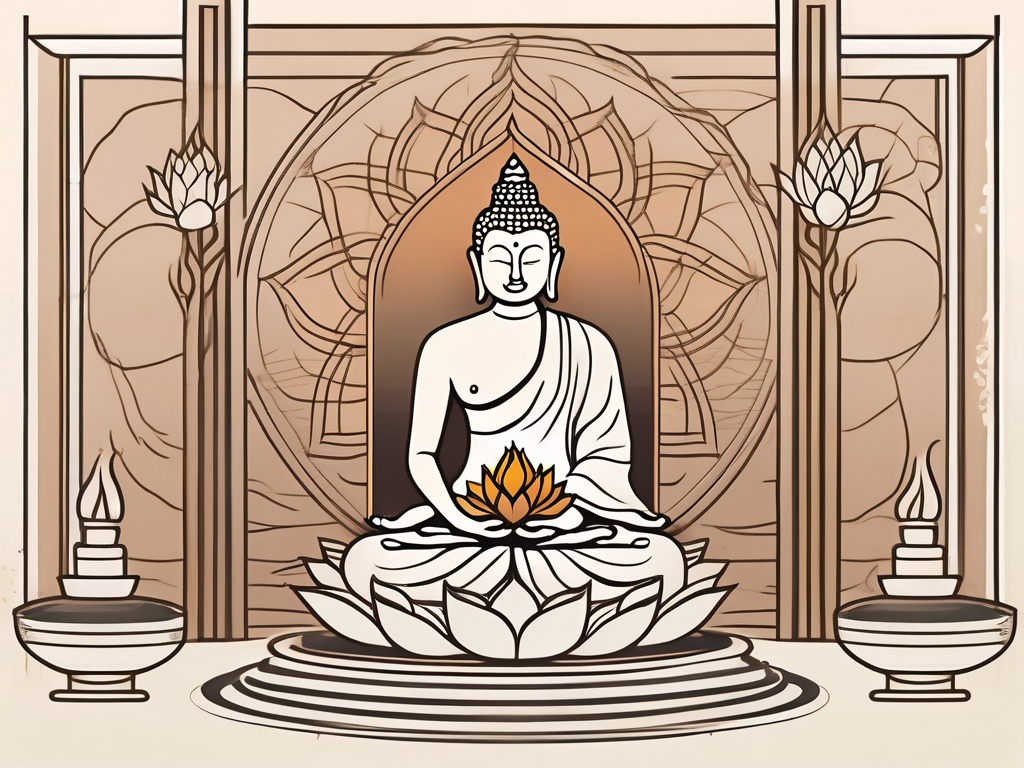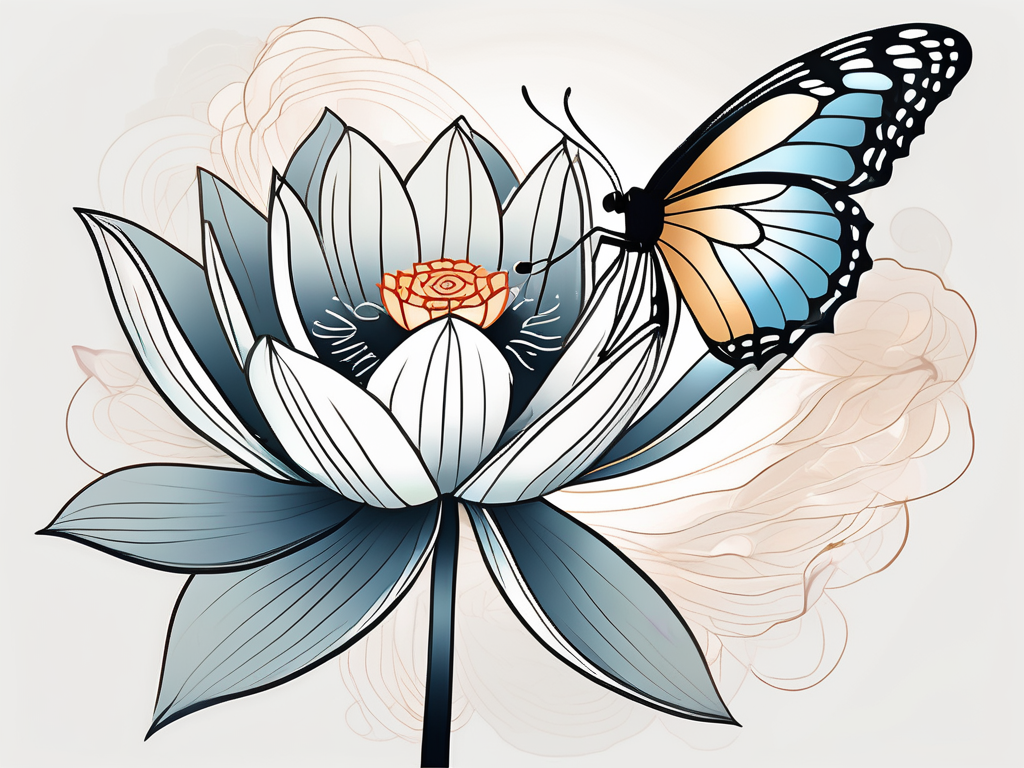In the bustling world we live in, many people are seeking peace, purpose, and spiritual fulfillment. For centuries, Buddhism has offered a path to enlightenment for individuals seeking solace and clarity. Central to Buddhist teachings is the concept of reincarnation, the belief that after death, individuals are reborn into new bodies. However, there is a growing interest in exploring Buddhism without the framework of reincarnation, taking a fresh perspective on this ancient path.
Understanding the Core Principles of Buddhism
Buddhism, one of the world’s major religions, is founded upon the principles of the Four Noble Truths, the Eightfold Path, and the Five Precepts. These fundamental teachings provide a framework for individuals seeking spiritual growth, inner peace, and liberation from suffering.
The Four Noble Truths
The Four Noble Truths form the cornerstone of Buddhist philosophy. They offer a profound understanding of the nature of existence and the human condition. The first truth acknowledges the reality of suffering in the world. It recognizes that suffering is an inherent part of life, encompassing physical pain, emotional distress, and the dissatisfaction that arises from unfulfilled desires.
The second truth delves into the causes of suffering, identifying craving, attachment, and ignorance as the root causes. It emphasizes that our desires and attachments lead to suffering, as they create a perpetual cycle of dissatisfaction and discontentment.
The third truth offers hope and liberation. It asserts that the cessation of suffering is attainable through the elimination of craving and attachment. By letting go of our desires and attachments, we can free ourselves from suffering and find lasting peace and happiness.
The fourth truth presents the Eightfold Path as the means to achieve liberation from suffering. It outlines a practical and comprehensive path that individuals can follow to cultivate wisdom, ethical conduct, and mental discipline.
The Eightfold Path
The Eightfold Path serves as a roadmap for individuals seeking to live a mindful and ethical life. It encompasses eight interconnected factors that guide practitioners towards spiritual development and personal growth.
The first factor, right understanding, involves developing a deep comprehension of the Four Noble Truths and the nature of reality. It encourages individuals to see things as they truly are, without delusion or distortion.
Right intention emphasizes the importance of cultivating wholesome intentions and motivations. It encourages practitioners to develop compassion, loving-kindness, and a genuine desire to alleviate suffering, both in themselves and others.
Right speech focuses on the power of words and communication. It encourages practitioners to speak truthfully, kindly, and harmoniously, avoiding harmful or divisive speech.
Right action emphasizes the importance of ethical conduct. It encourages individuals to act in ways that promote kindness, generosity, and respect for all living beings.
Right livelihood emphasizes the significance of engaging in a profession or occupation that is ethical and does not cause harm to oneself or others. It encourages individuals to choose a livelihood that aligns with their values and contributes positively to society.
Right effort emphasizes the importance of cultivating wholesome qualities and abandoning unwholesome ones. It encourages individuals to exert effort in developing positive qualities such as mindfulness, concentration, and wisdom.
Right mindfulness involves cultivating a moment-to-moment awareness of one’s thoughts, feelings, bodily sensations, and the surrounding environment. It encourages individuals to be fully present and attentive in each moment, fostering clarity and insight.
Right concentration involves developing focused and undistracted mental states through meditation and other contemplative practices. It cultivates a calm and concentrated mind, leading to deep insight and spiritual awakening.
The Five Precepts
Central to Buddhist ethics are the Five Precepts, which provide guidance for moral conduct and conscientious living. These precepts serve as a foundation for cultivating a peaceful and compassionate life.
The first precept is to refrain from harming living beings. It encourages individuals to cultivate kindness and compassion towards all sentient beings, promoting a sense of interconnectedness and respect for life.
The second precept is to refrain from stealing. It emphasizes the importance of respecting the property and belongings of others, fostering honesty and integrity.
The third precept is to refrain from engaging in sexual misconduct. It encourages individuals to cultivate healthy and respectful relationships, based on mutual consent, trust, and care.
The fourth precept is to refrain from speaking falsehoods. It emphasizes the importance of truthfulness, honesty, and integrity in our speech, promoting trust and harmony in our interactions with others.
The fifth precept is to refrain from consuming intoxicants. It encourages individuals to cultivate mindfulness and clarity of mind, avoiding substances that cloud judgment and lead to heedless or harmful actions.
By embracing and embodying the principles of the Four Noble Truths, the Eightfold Path, and the Five Precepts, individuals can embark on a transformative journey towards self-discovery, inner peace, and spiritual liberation.
The Concept of Reincarnation in Buddhism
Reincarnation, also known as rebirth, has been an integral part of Buddhist teachings since its early origins in ancient India. The belief in a cycle of birth, death, and rebirth has offered followers a sense of continuity and a way to understand the impermanent nature of existence.
According to Buddhist philosophy, the process of reincarnation is not limited to human beings but extends to all sentient beings. This includes animals, insects, and even celestial beings. The cycle of rebirth is believed to continue until one achieves enlightenment, breaking free from the cycle of suffering.
Historical Context of Reincarnation
The concept of reincarnation can be traced back to the time of Siddhartha Gautama, the historical Buddha. Born into a noble family in ancient India, Siddhartha embarked on a spiritual journey to seek answers to the fundamental questions of human existence. Through deep meditation and profound insight, he discovered the truth of reincarnation and incorporated it into his teachings.
In ancient India, the belief in reincarnation was not unique to Buddhism. It was a prevalent concept in various religious and philosophical traditions, including Hinduism and Jainism. However, Buddhism offered a unique perspective on reincarnation, emphasizing the impermanence of existence and the potential for liberation from the cycle of rebirth.
The Role of Karma in Reincarnation
Karma, the law of cause and effect, is closely tied to the concept of reincarnation in Buddhism. It suggests that one’s actions in this life will shape their future lives, creating a cycle of rebirth in an ongoing quest for liberation.
According to Buddhist teachings, every action, whether physical, verbal, or mental, leaves an imprint on one’s consciousness. These imprints, known as karmic seeds, determine the conditions of one’s future rebirths. Positive actions lead to favorable circumstances, while negative actions result in unfavorable conditions.
However, karma is not a deterministic force that solely determines one’s fate. Buddhism teaches that through awareness and mindful action, individuals can break free from the cycle of negative karma and attain liberation. This liberation, known as nirvana, marks the end of the cycle of rebirth and the attainment of ultimate peace and enlightenment.
It is important to note that the concept of karma in Buddhism is not based on a system of reward and punishment but rather on the understanding of cause and effect. It is a reminder of the interconnectedness of all beings and the responsibility each individual has in shaping their own destiny.
Buddhism Without Reincarnation: An Alternative View
Interpreting Anatta (Non-Self)
Anatta, or non-self, is a fundamental concept in Buddhism that challenges the idea of a permanent, unchanging soul. It invites practitioners to question the notion of a separate and enduring self, and instead encourages them to explore the interconnectedness of all things. While traditional interpretations of anatta often involve the belief in rebirth and the continuation of consciousness, there is an alternative view that offers a different perspective.
In this alternative view, some practitioners interpret anatta to suggest that individuals are not reborn as separate entities, but rather as a continuation of the ever-evolving universe. They see the concept of anatta as a profound recognition of the impermanence and interconnected nature of existence. Rather than focusing on the idea of a personal soul or consciousness that transcends death, this interpretation emphasizes the fluidity and interdependence of all phenomena.
According to this alternative understanding of anatta, the sense of self is not an isolated entity, but rather a temporary manifestation of the dynamic and ever-changing universe. It is like a wave in the ocean, arising and subsiding within the vast expanse of water. This perspective invites practitioners to let go of attachment to a fixed identity and instead embrace the ebb and flow of life.
Emphasizing Mindfulness and Present Moment
Another approach to Buddhism without reincarnation places a stronger emphasis on mindfulness and living in the present moment. While the traditional understanding of Buddhism often includes the belief in rebirth and the cycle of existence, this alternative view focuses on the transformative power of mindfulness and the cultivation of present moment awareness.
By emphasizing mindfulness, practitioners seek to develop a deep sense of presence and awareness in each moment. They recognize that dwelling on past lives or future existences can distract from fully engaging with the present reality. Instead of getting caught up in thoughts of reincarnation, they direct their attention to the here and now, embracing the richness and depth of present-moment experience.
This alternative approach to Buddhism acknowledges that the concept of reincarnation can be a source of inspiration and motivation for some practitioners. However, it also recognizes that not everyone resonates with this belief and that there are different paths to awakening and liberation. By focusing on mindfulness and the present moment, practitioners aim to cultivate inner peace and wisdom, detached from the notions of past lives or future existences.
In this view, the practice of mindfulness becomes a gateway to a deeper understanding of the self and the nature of reality. By becoming fully present in each moment, practitioners develop a heightened awareness of their thoughts, emotions, and sensations. They learn to observe these phenomena with curiosity and compassion, recognizing their impermanent and interdependent nature.
Through the practice of mindfulness, individuals can cultivate a sense of inner freedom and liberation, regardless of their beliefs about reincarnation. This alternative approach to Buddhism offers a path that is accessible to all, regardless of their views on the cycle of existence. It invites practitioners to explore the depths of their own experience and discover the transformative power of living in the present moment.
The Impact of Removing Reincarnation from Buddhist Practice
Changes in Meditation Practices
Without the framework of reincarnation, meditation practices can evolve to emphasize present-moment awareness rather than seeking spiritual progression across lifetimes. This shift allows individuals to develop deeper connections with their current reality and cultivate a sense of interconnectedness.
When practitioners no longer view meditation as a means to accumulate positive karma for future lives, they are free to explore the transformative power of mindfulness in the here and now. By redirecting their focus towards the present moment, meditators can fully immerse themselves in their immediate experience, whether it be the sensation of their breath, the sounds around them, or the thoughts passing through their minds.
With this shift in perspective, meditation becomes a tool for cultivating a profound sense of presence and interconnectedness. Practitioners learn to appreciate the interconnected nature of all beings and develop a deep sense of empathy and compassion. By engaging with the present moment, individuals can foster a greater understanding of their own thoughts, emotions, and experiences, leading to personal growth and self-discovery.
Shifts in Ethical Understanding
Removing the concept of reincarnation from Buddhism can lead to a reevaluation of ethical principles. Instead of being motivated by future karmic consequences, individuals focus on ethical conduct for the betterment of themselves and society in the present moment.
Without the belief in rebirth, individuals are encouraged to take responsibility for their actions and make ethical choices based on their immediate impact. This shift in ethical understanding promotes a sense of personal accountability and empowers individuals to make choices that align with their values and contribute to the well-being of others.
Furthermore, without the notion of future lives, individuals may find a renewed sense of urgency in addressing social and environmental issues. The focus shifts from accumulating positive karma for future rebirths to actively engaging in actions that alleviate suffering and promote justice in the world.
This reevaluation of ethical principles can lead to a more compassionate and engaged society, where individuals are motivated to work towards the betterment of all beings in the present moment. By recognizing the interconnectedness of all life and the impact of our actions, individuals can cultivate a deep sense of responsibility and actively contribute to creating a more harmonious and just world.
Criticisms and Controversies Around Buddhism Without Reincarnation
Traditionalist vs. Modernist Views
As with any adaptation of a beloved tradition, the exploration of Buddhism without reincarnation has sparked debates between traditionalists and modernists. Traditionalists argue that the core teachings should be preserved, while modernists advocate for evolving Buddhist practices to suit the needs and beliefs of contemporary society.
The Debate on Western Buddhism
Another contentious topic revolves around the adaptation of Buddhism to Western culture. Some argue that removing reincarnation aligns with Western philosophical beliefs, making Buddhism more accessible to a broader audience. Others argue that this approach dilutes the authenticity and richness of the tradition.
In conclusion, the exploration of Buddhism without the concept of reincarnation offers a fresh perspective on the spiritual path. By understanding the core principles, questioning traditional interpretations, and adapting practices to fit the modern world, individuals can embark on a journey of self-discovery and find meaning and fulfillment in the present moment. Whether one embraces the traditional beliefs of reincarnation or adopts an alternative view, the essence of Buddhism remains a beacon of wisdom and compassion in an ever-changing world.











